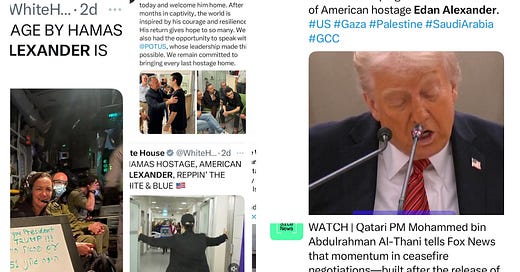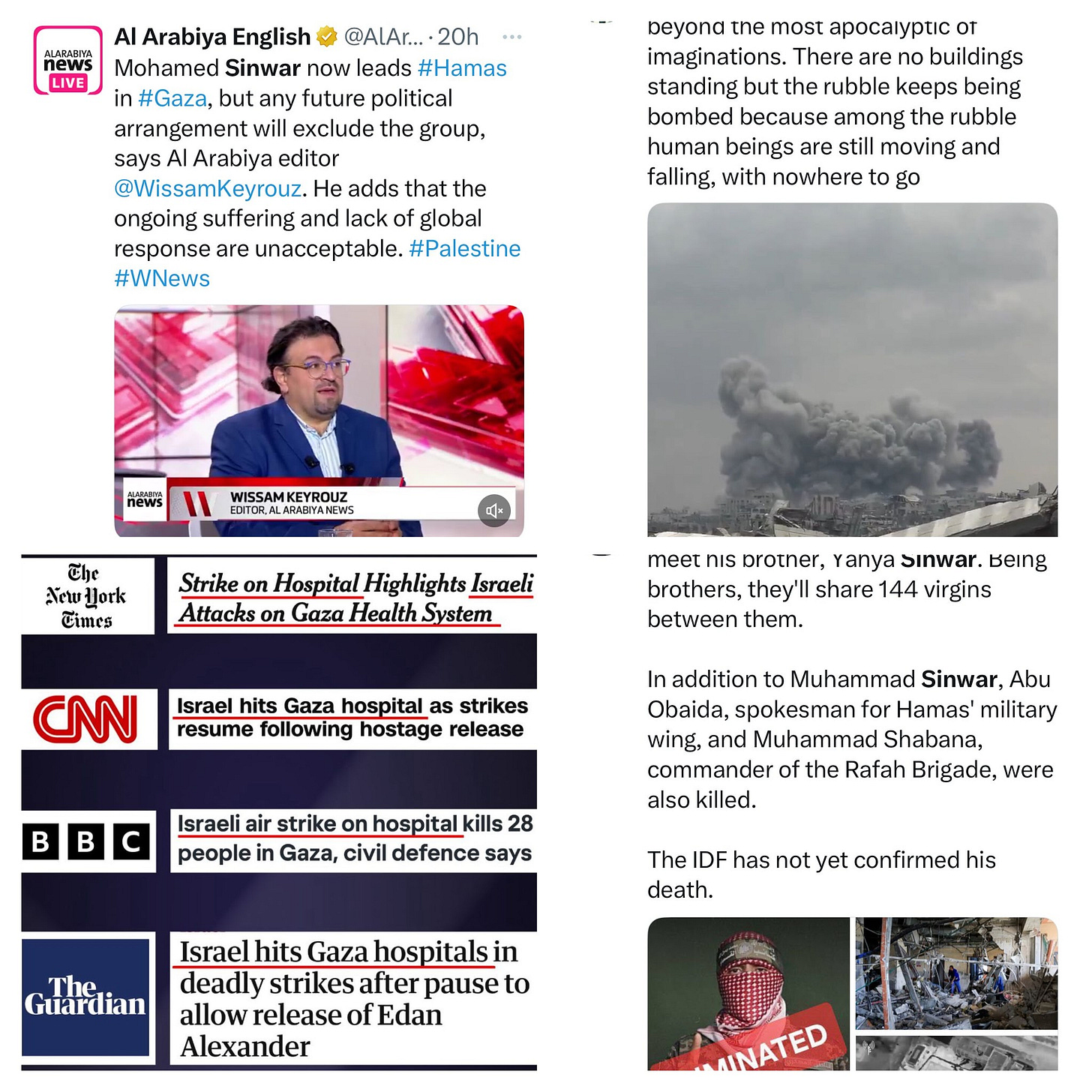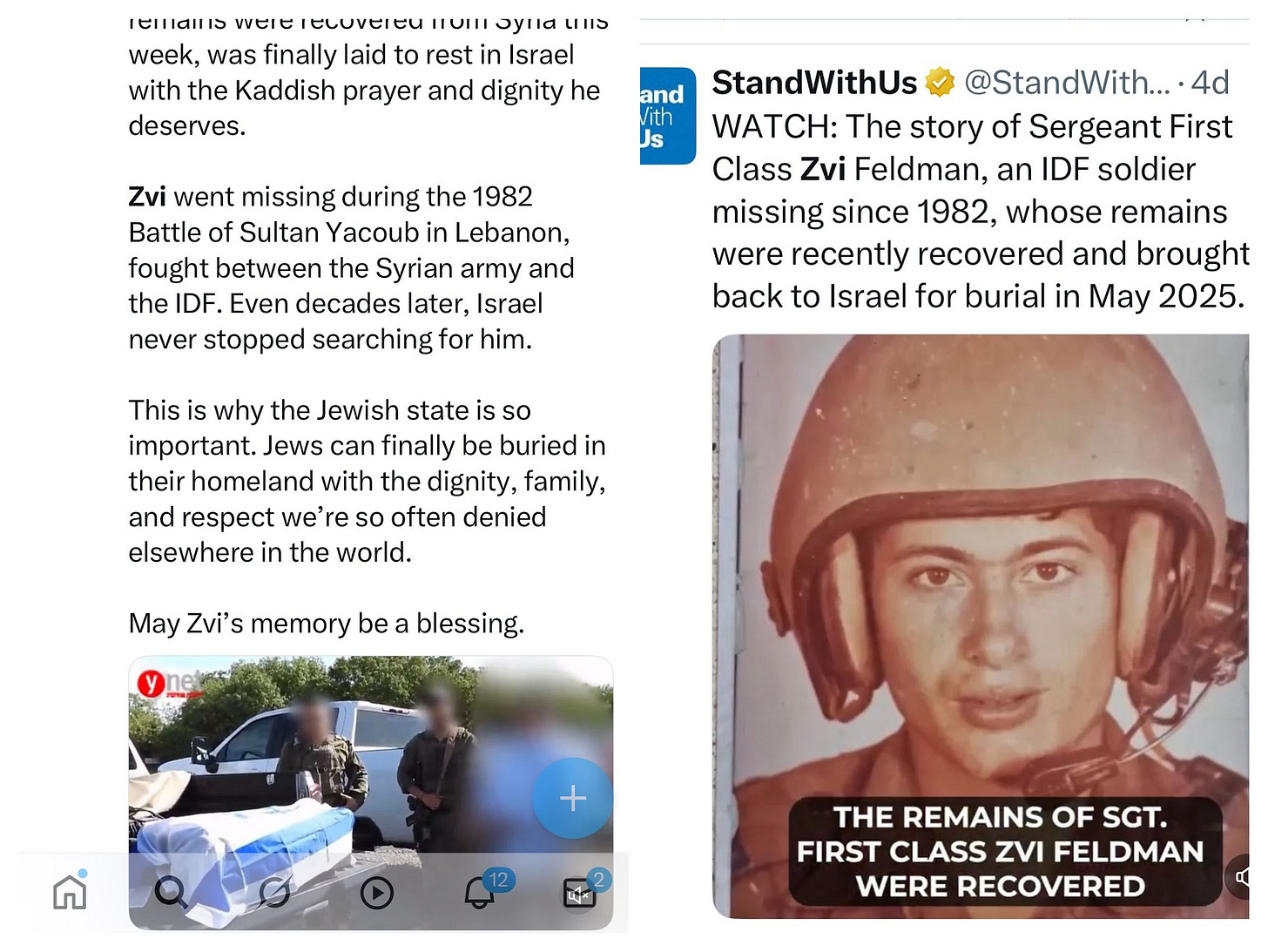Israel at War - Day 587
1. U.S. President Trump’s Middle East Visit
Earlier this week, President Trump embarked on a visit to the Middle East, with Saudi Arabia as the first stop on his three-nation tour, which includes Qatar and the United Arab Emirates. The visit included a Gulf Cooperation Council summit, where discussions focused on regional stability, the Gaza conflict, and Iran's nuclear program. The visit is marked by major commercial and arms deals with Saudi Arabia and Qatar, as well as potential geopolitical shifts that could have far-reaching implications on Israel and the Gaza war. President Trump did not include Israel in his trip, yet said that the Gulf trip was “very good for Israel” and vowed to achieve the release of the remaining Israeli hostages.
Speaking at an investment summit in Riyad, Trump expressed his “fervent desire” for Saudi Arabia to join the Abraham Accords and normalize relations with Israel, yet acknowledged that Saudi Arabia would proceed "in your own time." Israeli and international media also reported that President Trump de-linked the issue of Saudi Arabia developing civil nuclear capabilities from the normalization efforts. Saudi Arabia has maintained that normalization with Israel is contingent upon significant progress towards Palestinian statehood, aligning with the Arab Peace Initiative (API). The API is a 10-sentence proposal for an end to the Arab–Israeli conflict that was endorsed by the Arab League in 2002 at the Beirut Summit. Crown Prince Mohammed bin Salman reiterated the kingdom's commitment to a "sustainable solution to the Palestinian cause" during the investment summit. A recent survey conducted in Israel shows that a majority of Israelis are in favor of normalization with Saudi Arabia.
In a separate development, President Trump met with Syria's new leader, Ahmed al-Sharaa. Also present at the meeting were Saudi Arabian Crown Prince Mohammed bin Salman and Turkey’s President Erdogan, who joined the meeting by video conference. At the meeting, Trump announced the lifting of longstanding U.S. sanctions on Syria and called upon Syria’s president, A-Shara’a, to recognize Israel by joining the Abraham Accords. Al-Sharaa reportedly agreed in principle but cited internal challenges that need to be addressed first.
During the Gulf Cooperation Council Summit, President Trump also addressed Iran’s nuclear ambitions, where he called on Tehran to choose a "new and better path" by agreeing to a revised nuclear deal similar to the JCPOA of 2015. He warned that failure to comply would result in "massive maximum pressure" from the United States. He reiterated that Tehran “must stop sponsoring terror, halt its bloody proxy wars”.
While in Doha, Qatar, President Trump reiterated his controversial proposal to transform the Gaza Strip into a "freedom zone" under U.S. oversight. Trump emphasized the need to address the humanitarian crisis in Gaza and indicated that Hamas would "have to be dealt with" as part of this initiative.
Opposition leaders and analysts commented on the fact that Israel was excluded from President Trump’s visit and the Riyadh summit, as a missed opportunity and a sign of Israel’s diplomatic isolation and voiced concerns over President Trump’s shift on Saudi Arabia nuclear plans.
2. Edan Alexander, An Israeli-American Hostage Was Released Due to American Pressure
Hamas released Edan Alexander, who was held hostage in Gaza since October 7th. Alexander is the first soldier to be released. He has dual citizenship- Israeli and American. As an American citizen, he volunteered to join the Israeli army, and was taken to Gaza on October 7th. The negotiations for his release were coordinated by Steve Witkoff, Trump’s special envoy to the negotiations between Israel and Hamas. The deal was closed without the consent or involvement of the Israelis, and Israel did not have to give anything in exchange, nor did it have to release any Palestinian prisoners. Witkoff traveled to Israel with the mother of Edan, and they were all taken to the southern army base to be the first to meet the released soldier when he arrived from Gaza with the Red Cross.
The deal embarrassed PM Netanyahu and his negotiation team, who were involved. PM Netanyahu’s supporters attacked Edan and his mother, who thanked President Trump and his envoy, and did not thank PM Netanyahu for the release.
Witkoff then visited the hostages’ square in Tel Aviv, a place in the center of the city, where the hostages’ families gather daily in a protest, and hold large rallies every Saturday night, with a strong cry for the release of all the hostages. He met with the families, and promised them to continue doing all he can for the release of the 58 hostages who are still held in captivity in Gaza. He also gave Edan a necklace which belonged to his late son, who passed away. This gesture reflected an act of humanity, many said more than any of the members of PM Netanyahu’s government ever expressed to the families of the hostages.
Witkoff met with PM Netanyahu. The Trump administration is trying to push a deal that will release all the hostages and end the war. PM Netanyahu is still hesitant, since he promised to eliminate Hamas and aims for a total victory.
3. Israel May Have Killed The Current Head of Hamas In Gaza, Muhammad Sinwar
In an intensive Israeli air force strike on a hospital site in southern Gaza Strip - Israel believes that it managed to kill the current head of the operative military section of Hamas. Muhammad Sinwar is the successor of his older brother, Yahyeh, who was also killed by Israeli forces. The younger brother was considered to be even more extremist in terms of the war with Israel and tougher in terms of the negotiations to release the hostages. He insisted on ending the war with the full withdrawal of all Israeli forces from the entire Gaza Strip as a precondition to release the rest of the hostages. In the air forces strike Israel attacked a hospital and killed many Palestinians. Israel insisted that Hamas held a military operations site under the hospital in southern Gaza. The death of Sinwar has not been confirmed yet. It is important to mention in this context that the policy makers of Hamas live in Qatar. Israeli sources say that Sinwar was too tough in the negotiations with Israel on the hostages and that they hope that once he is off stage, it will be easier to close a deal with Hamas.
4. In an Heroic Operation Behind Enemy Lines, Israeli Special Forces Retrieved the Body of an Israeli Soldier Who Fell in Combat in 1982
The body of Zvi Feldman was rescued from a cemetery deep in Syria 43 years after his death. Feldman was a young soldier when Israel invaded Lebanon back in 1982, during what is called the first Lebanon war. He was in a tank and was involved in an intense battle in southern Lebanon. All his colleagues in the tank disappeared, and Israel lost track of them. One of them was rescued a few years ago, alive, the others died in combat and were buried in a cemetery in Syria. Israel tried to track their remains for years, and was able to rescue one a few years ago and bring his remains for burial in Israel. Earlier this week, special intelligence and operational Mossad units managed to penetrate deep into Syria, locate the cemetery, take DNA samples for tests, and when they made sure they were the remains of the Israeli soldiers, they returned them to Israel. His funeral was held earlier this week in Israel, 43 years after his death. The remains of one last soldier from this battle are still missing.
5. Israeli Song for Eurovision Contest Made It to Finals
24-year-old Yuval Raphael who is representing Israel at the Eurovision song contest with the song “New Day Will Rise” has successfully advanced to the finals that will take place on Saturday, May 17th, in Basel, Switzerland. Her performance at the semi-finals received both warm applause as well as some booing from pro-Palestinians in the audience.
Raphael's personal story has drawn significant attention. A survivor of the deadly Hamas October 7th attack at the Nova music festival, Rephael hid with dozens of other people in a sheltered area for hours, covered in the bodies of those killed by Hamas militants.
Israel's song to the contest was described by the Israeli delegation as a manifestation of hope, love, and resilience. Israel's participation in the Eurovision has sparked protests and calls for exclusion from several countries, including Ireland, Slovenia, and Spain, due to Israel's ongoing military actions in Gaza and a looming starvation crisis. The Basel police have enhanced security measures following threats on Raphael.









